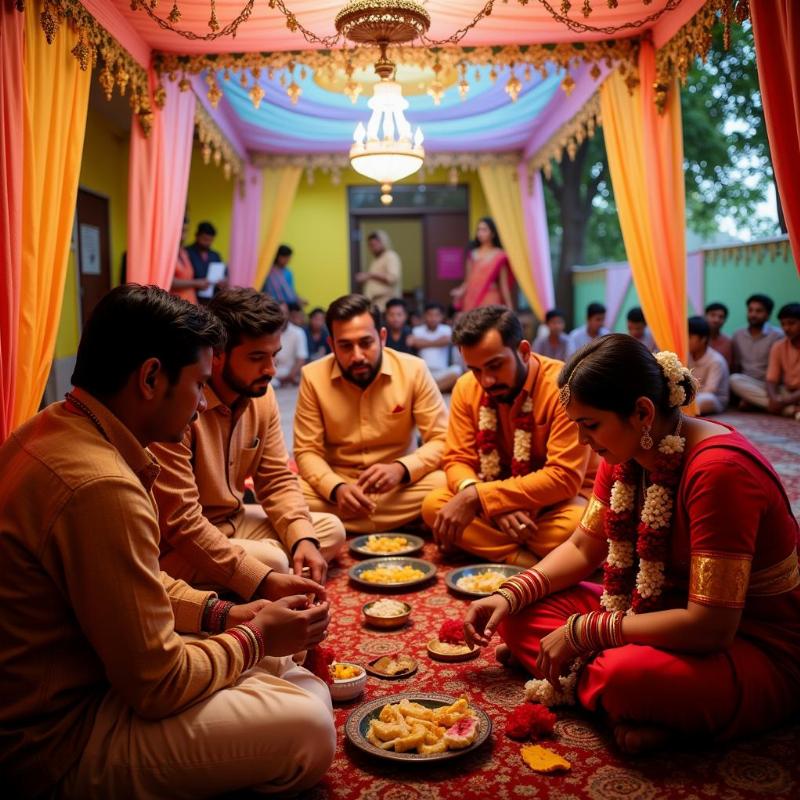Understanding the nuances of a language can be tricky, especially when dealing with phrases like “took place.” If you’re trying to grasp its meaning in Bengali, or translate a sentence where it’s used, this guide is for you. We’ll explore the various ways “took place” is expressed in Bengali, and how its meaning can shift depending on the context.
Understanding “Took Place” in Different Contexts
“Took place” generally refers to an event happening at a specific time and location. In Bengali, several words and phrases can convey this meaning, and choosing the right one depends on the nature of the event. Let’s delve into some common scenarios:
Events and Occasions
For general events or occasions, the Bengali word “হয়েছিল” (hoyechilo – past tense of “hoy”) is often used. This translates directly to “happened” and can be used for anything from a small gathering to a large festival. For instance, “The wedding took place in Kolkata” would be “বিবাহটা কলকাতায় হয়েছিল” (bibahta Kolkata-y hoyechilo).
 A Bengali wedding taking place in Kolkata
A Bengali wedding taking place in Kolkata
Formal Gatherings or Meetings
For more formal events like meetings or conferences, “অনুষ্ঠিত হয়েছিল” (onushthito hoyechilo – past tense of “onushthito hoy”) is a more suitable option. This translates to “was held” or “took place.” For example, “The meeting took place at the office” becomes “সভাটি অফিসে অনুষ্ঠিত হয়েছিল” (sabhati office-e onushthito hoyechilo).
Specific Actions or Occurrences
When describing a specific action or occurrence, you might use more specific verbs. For instance, if you want to say “The accident took place near the bridge,” you could use “ঘটেছিল” (ghotechilo – past tense of “ghote”), which translates more directly to “occurred.” The sentence would be “দুর্ঘটনাটি সেতুর কাছে ঘটেছিল” (durghatonati setur kache ghotechilo).
Common Mistakes to Avoid
A common mistake is directly translating “took place” word-for-word, which can lead to unnatural-sounding Bengali. It’s important to consider the context and choose the most appropriate verb or phrase.
Tips for Accurate Translation
- Consider the context: Is it a formal event, a casual gathering, or a specific incident?
- Choose the right verb: Use the most appropriate verb to describe the event.
- Consult a dictionary or native speaker: If you’re unsure, always double-check with a reliable resource.
Conclusion: Mastering “Took Place” in Bengali
Understanding the nuances of “took place” in Bengali involves more than just a direct translation. By considering the context and choosing the appropriate vocabulary, you can express yourself accurately and fluently. Remember to practice and consult resources when needed, and you’ll soon master this essential phrase. Now you’re equipped to confidently translate and understand “took place” in various Bengali contexts.
FAQ
-
What is the most common Bengali translation for “took place”? The most common translation is “হয়েছিল” (hoyechilo), which means “happened.”
-
Can I use “হয়েছিল” (hoyechilo) for all instances of “took place”? While generally applicable, using more specific verbs like “অনুষ্ঠিত হয়েছিল” (onushthito hoyechilo) for formal events provides more accurate and natural-sounding translations.
-
Where can I find more information on Bengali vocabulary? Online dictionaries, language learning apps, and textbooks are excellent resources for expanding your Bengali vocabulary.
-
How can I improve my understanding of Bengali grammar? Immersing yourself in the language through reading, listening, and speaking practice is crucial for improving your grasp of Bengali grammar.
-
Is it important to understand the context when translating “took place”? Absolutely! Context is crucial for choosing the right verb and ensuring your translation is accurate and natural.
About PlaToVi: PlaToVi is your one-stop solution for all your travel needs, specializing in crafting unforgettable experiences. Whether you’re looking for traditional tour packages, hotel and resort bookings, flight tickets, event planning, car rentals, or visa assistance, we’ve got you covered. Contact us today to start planning your dream journey! Email: [email protected], Phone: +91 22-2517-3581.